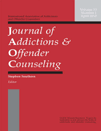
JOURNAL OF ADDICTIONS & OFFENDER COUNSELING
Scope & Guideline
Bridging Gaps in Understanding Addictions and Offender Dynamics
Introduction
Aims and Scopes
- Addiction Treatment and Counseling:
The journal emphasizes research on effective counseling techniques and treatment approaches for individuals struggling with various forms of addiction, including substance use disorders and behavioral addictions. - Vulnerable Populations:
A core focus is on marginalized groups, including LGBTQ+ individuals, racial and ethnic minorities, and justice-involved persons, highlighting the need for culturally competent and inclusive counseling practices. - Trauma-Informed Care:
The journal explores the impact of trauma on addiction and recovery, advocating for trauma-informed approaches in counseling to better support clients with complex histories. - Interdisciplinary Perspectives:
It encourages interdisciplinary research that integrates insights from psychology, social work, public health, and criminal justice to inform addiction and offender counseling. - Emerging Trends in Counseling Practices:
The journal seeks to keep pace with evolving trends in counseling practices and technologies, including telehealth and mindfulness-based interventions.
Trending and Emerging
- Telehealth and Digital Interventions:
Recent publications have highlighted the efficacy and implementation of telehealth interventions for substance use treatment, particularly in the wake of the COVID-19 pandemic, showcasing the relevance of technology in modern counseling. - Culturally Competent Care:
There is a growing focus on the experiences and needs of diverse populations, such as queer, transgender, and racially marginalized individuals, emphasizing the importance of culturally sensitive practices in addiction counseling. - The Role of Family and Community in Recovery:
Emerging research is increasingly exploring the impact of family dynamics and community resources on recovery outcomes, reflecting a holistic understanding of addiction as a social issue. - Integration of Mental Health and Addiction Treatment:
The journal is seeing more studies that examine the interplay between mental health issues and substance use disorders, advocating for integrated treatment approaches that address co-occurring conditions. - Mindfulness and Alternative Therapies:
There is a notable trend towards incorporating mindfulness and other alternative therapeutic practices within addiction treatment frameworks, reflecting a shift towards more comprehensive and adaptive recovery strategies.
Declining or Waning
- Traditional Substance Use Treatment Models:
Research centered on conventional treatment modalities for substance use disorders appears to be decreasing, as the field moves towards integrative and holistic approaches that emphasize recovery capital and personal strengths. - Generalized Studies on Substance Use:
There is a noticeable decline in broad studies that do not consider specific populations or contexts, indicating a shift towards more targeted research that addresses the unique needs of vulnerable groups. - Focus on Incarceration Alone:
Research focusing solely on the experience of incarceration without considering the broader context of community-based recovery and reintegration is becoming less common, reflecting a growing understanding of the importance of post-incarceration support.
Similar Journals

Substance Abuse
Leading the dialogue on substance abuse research.Substance Abuse is a premier scholarly journal published by SAGE Publications Inc, dedicated to advancing the understanding and treatment of substance use disorders. With an established presence from 1995 to 2023, the journal boasts an impressive Q1 ranking in both Medicine (miscellaneous) and Psychiatry and Mental Health, positioning it among the top tier of academic publications in these fields. Researchers and professionals will find its articles, which are grounded in rigorous empirical studies and innovative interventions, essential for addressing the complex and multifaceted nature of substance abuse. Although not an open access publication, Substance Abuse maintains a commitment to sharing valuable insights and findings, making it a vital resource for those looking to enhance their knowledge and practice. Located in Thousand Oaks, CA, this journal serves as a critical forum for international dialogue and research dissemination, ensuring that current trends and challenges in substance use are thoughtfully examined and discussed within the academic community.
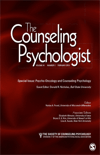
COUNSELING PSYCHOLOGIST
Advancing the Art and Science of Counseling Psychology.COUNSELING PSYCHOLOGIST, published by SAGE PUBLICATIONS INC, stands out as a leading journal in the field of applied psychology, recognized for its significant impact and contribution to the discipline. Established in 1969, this esteemed journal encompasses a broad spectrum of topics relevant to counseling psychology, providing a platform for empirical research, theoretical advancements, and practical applications. With an impressive 2023 impact factor placing it in the Q1 category and achieving a rank of 76 out of 249 in Scopus's Applied Psychology category, the journal is pivotal for researchers, clinicians, and educators aiming to stay at the forefront of advancements in counseling practices. Located in the United States, COUNSELING PSYCHOLOGIST is committed to advancing psychological scholarship and bridging the gap between research and practical implementation, making it an invaluable resource for those dedicated to improving mental health outcomes.
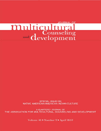
JOURNAL OF MULTICULTURAL COUNSELING AND DEVELOPMENT
Bridging cultural divides in psychological practice.Welcome to the Journal of Multicultural Counseling and Development, a leading scholarly publication dedicated to advancing the understanding and practice of multicultural counseling. Published by Wiley, this esteemed journal has been at the forefront of research since its inception in 1985, providing a crucial platform for the dissemination of knowledge in the fields of Applied Psychology and Cultural Studies, as evidenced by its notable Q3 and Q1 rankings in the 2023 category quartiles. With an ISSN of 0883-8534 and an E-ISSN of 2161-1912, the journal is easily accessible to researchers and practitioners worldwide, despite not currently offering open access. Its rigorous peer-review process ensures high-quality contributions, aiding professionals in enhancing their multicultural competencies. As we progress through 2024, the journal continues to foster interdisciplinary dialogue and innovative approaches to counseling and development, reinforcing its vital role in shaping inclusive practices and policies in the diverse landscape of psychological services.
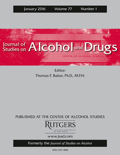
Journal of Studies on Alcohol and Drugs
Illuminating the complexities of alcohol and drug research.The Journal of Studies on Alcohol and Drugs is a premier academic journal dedicated to advancing the understanding of alcohol and drug use, its effects, and its societal implications. Published by ALCOHOL RES DOCUMENTATION INC at the Center for Alcohol Studies, Rutgers University, this journal features comprehensive research that spans the disciplines of health, psychiatry, mental health, and toxicology. With its Q1 ranking in Health (Social Science) and Q2 ranking in Psychiatry and Mental Health, the journal plays a vital role in disseminating high-impact research that informs policy, prevention, and treatment strategies in addiction and substance use. The journal contributes significantly to the field, as evidenced by its solid Scopus rankings and engagement with contemporary issues, making it an essential resource for researchers, practitioners, and students. Although it does not offer open access, the journal's commitment to rigorous peer review and scholarship ensures that it remains at the forefront of research on alcohol and drugs through its converged publication timeline from 2007 to 2024.
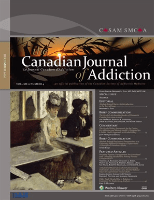
Canadian Journal of Addiction
Illuminating the path to understanding addiction.Canadian Journal of Addiction is a leading platform dedicated to advancing the understanding of addiction and its multifaceted impacts on individuals and society. Published by LIPPINCOTT WILLIAMS & WILKINS, this journal aims to foster rigorous research and discussion in the field of addiction studies, contributing significantly to the intersection of psychiatry and mental health. With its ISSN 2368-4720 and E-ISSN 2368-4739, the journal is indexed in Scopus and has been categorized in the Q3 quartile for 2023, reflecting its emerging influence amongst peers. The Canadian Journal of Addiction facilitates a vital exchange of ideas and findings, crucial for researchers, practitioners, and students alike, addressing pressing issues related to addiction through innovative studies and insightful reviews. Subscribers and readers benefit from the latest findings as they navigate through the dynamic landscape of addiction research, enriching both academic knowledge and practical applications.

INTERNATIONAL JOURNAL OF OFFENDER THERAPY AND COMPARATIVE CRIMINOLOGY
Elevating criminological studies for a better tomorrow.INTERNATIONAL JOURNAL OF OFFENDER THERAPY AND COMPARATIVE CRIMINOLOGY, published by SAGE PUBLICATIONS INC, is a leading journal in the fields of criminology, psychology, and forensic medicine, with a robust legacy dating back to 1966. With ISSN 0306-624X and E-ISSN 1552-6933, this journal presents innovative research and theoretical discussions that seek to improve offender rehabilitation and comparative criminological studies. The journal’s high-impact contributions have garnered it a prestigious Q1 ranking in Arts and Humanities and a Q2 ranking in Pathology and Forensic Medicine as of 2023, making it a valuable resource for scholars and practitioners alike. Researchers will find the journal's commitment to advancing knowledge through empirical evidence and critical analysis particularly compelling, as it addresses contemporary challenges in offender therapy. Though not an Open Access journal, its diverse scope ensures that readers have access to pivotal insights that drive progress and inform policy in justice and rehabilitation systems. With a focus on interdisciplinary approaches, the journal serves as an essential platform for academics, professionals, and students aiming to deepen their understanding of comparative criminology and its applications.
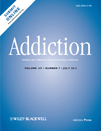
ADDICTION
Advancing knowledge in addiction science.ADDICTION, published by Wiley, is a highly regarded academic journal that serves the vibrant fields of Medicine and Psychiatry and Mental Health. With an impressive impact factor reflective of its significance—ranking in the top 8% and 7.5% of its categories respectively—this journal is esteemed for its rigorous peer-reviewed research which spans a wide array of topics related to addiction, including pharmacology, prevention, and treatment modalities. Since its inception in 1993, ADDICTION has continually provided a platform for innovative research, shaping the discourse and influencing clinical practices worldwide. This journal, based in the United Kingdom at a prestigious location in Hoboken, NJ, stands as a beacon for researchers, practitioners, and students alike, committed to advancing understanding and strategies to combat addiction-related challenges. Although it is not an Open Access publication, the journal's contribution to the field remains invaluable, ensuring that cutting-edge findings are disseminated widely among professionals dedicated to improving mental health outcomes.

Substance Abuse and Rehabilitation
Fostering collaboration for effective treatment strategies.Substance Abuse and Rehabilitation, published by DOVE MEDICAL PRESS LTD, is a leading open-access journal dedicated to the study and treatment of substance abuse and related rehabilitation practices. With its ISSN 1179-8467, this journal provides a vital platform for researchers, clinicians, and students to disseminate their findings and insights in a field increasingly relevant to public health. Since becoming open access in 2010, the journal has enhanced its reach, allowing for a broader audience to engage with cutting-edge research and reviews that address the complexities of substance abuse disorders. The journal aims to foster innovation and interdisciplinary collaboration by publishing high-quality peer-reviewed articles that cover a wide range of topics, including addiction therapy, policy implications, and the social determinants of substance use. As a vital resource within the realm of addiction research, Substance Abuse and Rehabilitation plays a crucial role in driving forward knowledge and practices that can improve outcomes for individuals and communities affected by substance use issues.

INTERNATIONAL JOURNAL FOR THE ADVANCEMENT OF COUNSELLING
Shaping the Conversation in Counseling and PsychologyINTERNATIONAL JOURNAL FOR THE ADVANCEMENT OF COUNSELLING, published by Springer, is a distinguished peer-reviewed journal that caters to the evolving field of counseling and its myriad applications in psychology and education. With an ISSN of 0165-0653 and an E-ISSN of 1573-3246, this journal has been contributing to the discourse since its inception in 1978, embracing a rich history of scholarship extending well into 2024. Notably classified within the Q3 quartile in Applied Psychology and the Q2 quartiles in both Education and Miscellaneous Psychology categories, it garners substantial attention in the academic community, as evidenced by its significant rankings in Scopus—#35/97 in Psychology (miscellaneous) and #616/1543 in Social Sciences (Education). The journal’s mission is to promote research that enhances the practice, understanding, and theory of counseling, addressing contemporary challenges and innovative methodologies in the field. Although it does not offer open access, its impact factor signifies its importance in shaping future research. The INTERNATIONAL JOURNAL FOR THE ADVANCEMENT OF COUNSELLING is an essential resource for researchers, professionals, and students aiming to enrich their expertise and contribute to the advancement of counseling practices.

Adicciones
Elevating research to combat addiction challenges.Adicciones is a prominent academic journal dedicated to the fields of Medicine and Psychiatry, focusing on the multi-faceted issues surrounding addiction and substance use. Published by SOCIDROGALCOHOL in Spain, this journal has been a critical resource for researchers, clinicians, and students since its inception in 1994, with a commitment to advancing knowledge in addiction science for the benefit of public health. With an impressive impact factor that places it in the Q3 category of both Medicine (Miscellaneous) and Psychiatry and Mental Health according to 2023 rankings, Adicciones is recognized for its high-quality peer-reviewed articles that contribute to the ongoing dialogue in these vital fields. Although not currently an open-access journal, it provides valuable subscription-based access to its extensive repository of research findings and reviews, fostering a deeper understanding of the complex dynamics of addiction. The journal's continued relevance is underscored by its convergence into 2024, promising ongoing contributions that inspire new ideas and practices to combat addiction.